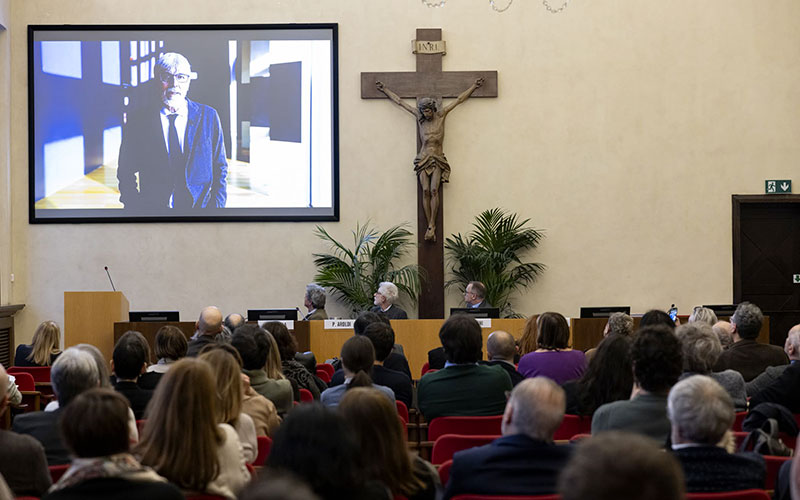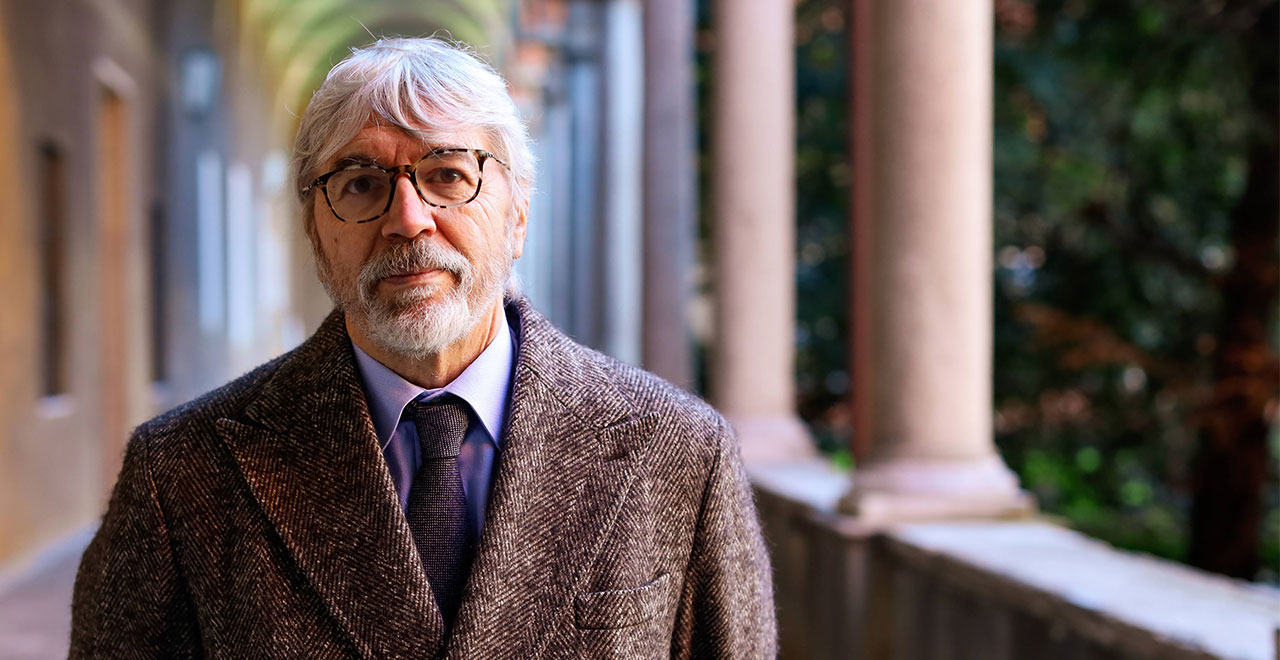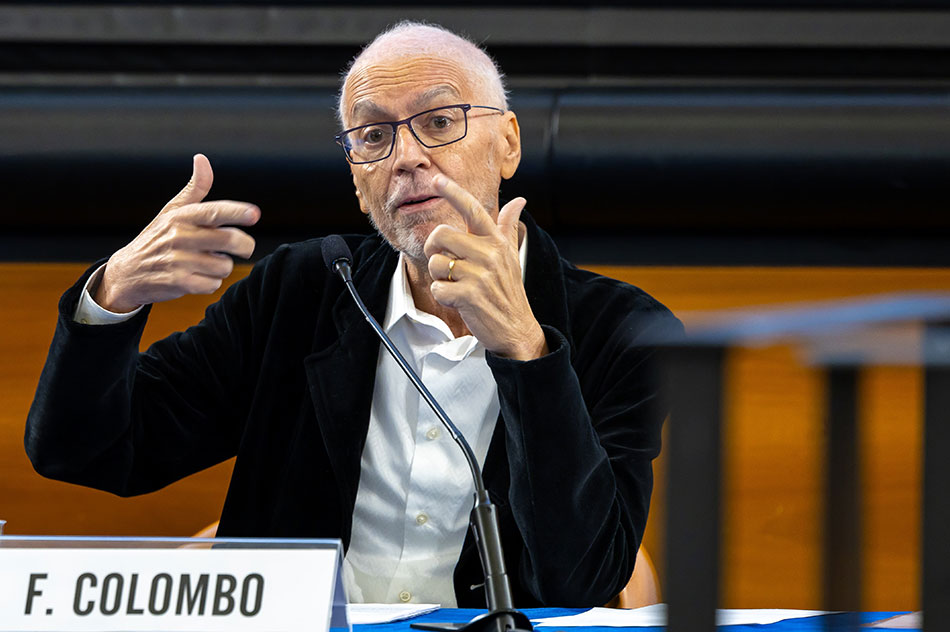
News | La riflessione
Ciò che lascia Fausto Colombo
Nel primo anniversario della morte, un’ampia comunità scientifica si è interrogata sull’eredità dello studioso della comunicazione in un convegno organizzato dall’Ateneo.
| Francesco Chiavarini
14 gennaio 2025
Condividi su:

Explorer of the media and popular culture, animator of research centres and academic initiatives, professor loved by more than a generation: this, in short, is the portrait of Fausto Colombo, who died in Monza on the morning of 14 January 2025. The funeral will be held in Milan on Thursday 16 January, at 11 a.m., at Sant'Ambrogio basilica.
Born in Milan on 16 April 1955, Colombo had been a student of Gianfranco Bettetini at Università Cattolica del Sacro Cuore, where his career as a scholar and lecturer had mainly taken place. In Milan he had taught Theory and Techniques of Media first at the Faculty of Arts and Philosophy and then at Political and Social Sciences. Also in Milan, he had directed the Department of Communication and Performing Arts and the specialising master's degree in Communication, Digital Marketing and Interactive Advertising. In recent years, he had put his expertise at the service of the University in communication activities and the promotion of the University's image, as delegate of the Rector Franco Anelli and, most recently, as pro-rector.
Popular culture that unites the country - Fausto Colombo's lecture (INTEGRAL VIDEO)
Internationally renowned, Colombo had collaborated with several European universities. At Università della Svizzera Italiana he had been professor in charge of the Media Genres and Formats course, at the Université Stendhal in Grenoble he had held the UNESCO Chair in International Communication, he had taught as visiting professor at Université Lumière in Lyon and at the Sorbonne in Paris, where he had also been a member of the Scientific Council of CELSA, the school for advanced studies in information and communication sciences. Member of the Academia Europaea. Finally, he had been a member of the selection committee of the Film, media and visual studies section.
An article by


Internationally renowned, Colombo had collaborated with several European universities. At Università della Svizzera Italiana he had been professor in charge of the Media Genres and Formats course, at the Université Stendhal in Grenoble he had held the UNESCO Chair in International Communication, he had taught as visiting professor at Université Lumière in Lyon and at the Sorbonne in Paris, where he had also been a member of the Scientific Council of CELSA, the school for advanced studies in information and communication sciences. Member of the Academia Europaea. Finally, he had been a member of the selection committee of the Film, media and visual studies section.
Creator of the Research Centre for Communication and Media at Università Cattolica (OssCom), which he directed for 18 years, he had participated in research projects of national interest and collaborated with major companies and cultural institutions.
Since the beginning of his career, Colombo had been concerned with the link between digitalisation and social transformation. The result of these interests are his debut volume Gli archivi imperfetti (Vita e Pensiero, 1986), Le nuove tecnologie della comunicazione (Bompiani, 1994), written with Gianfranco Bettetini, and La digitalizzazione dei media (Carocci, 2007). In the second decade of the 2000s, he had entered the vein of critical analysis of the web with Il potere socievole. Storia e critica dei social media (Bruno Mondadori, 2013) and a series of essays on phenomena such as trolling, data control and privacy challenges. A series of empirical investigations on the links between digitalisation phenomena and generational belonging also fall into this period. By 2020, this set of experiences had converged in ‘a manifesto for a “gentle” communication’ published by Vita e Pensiero as Ecologia dei media. One of Colombo's most personal and characteristic books, Imago pietatis, lucida riflessione sul legame tra fotografia e compassione, was also published by Vita e Pensiero in 2018.
Another theme that Colombo investigated with continuity was the history of the media in Italy. He had explored the subject in depth, for example, in La cultura sottile (Bompiani, 1998), in the autobiographical Boom (Rizzoli, 2008) and in Il Paese leggero (Laterza, 2012).
On 13 November 2024, already ill, Colombo gave a crowded open lecture in the Aula Magna of Università Cattolica Milan campus in Largo Gemelli, once again returning to the theme of the relationship between high and low, elite and community culture. The text of the lecture, on the revision of which the professor worked until the last days, will be published in the coming months by Vita e Pensiero. This latest Lezione sulla cultura popolare (this is the announced title) will soon be joined by the essay Una storia in comune. Perché la cultura pop racconta chi siamo, written with Lorenzo Luporini and to be published by Mondadori in February.